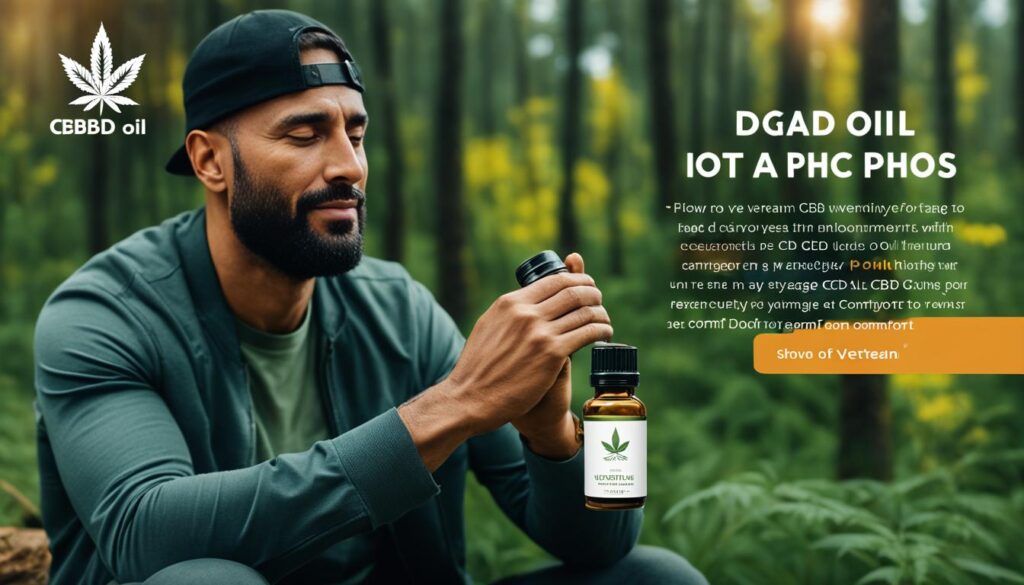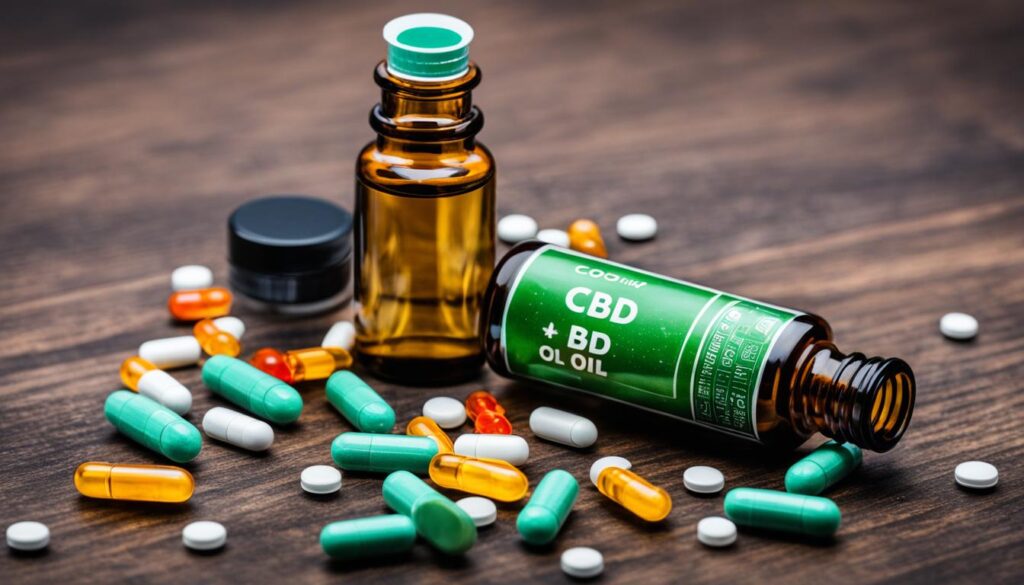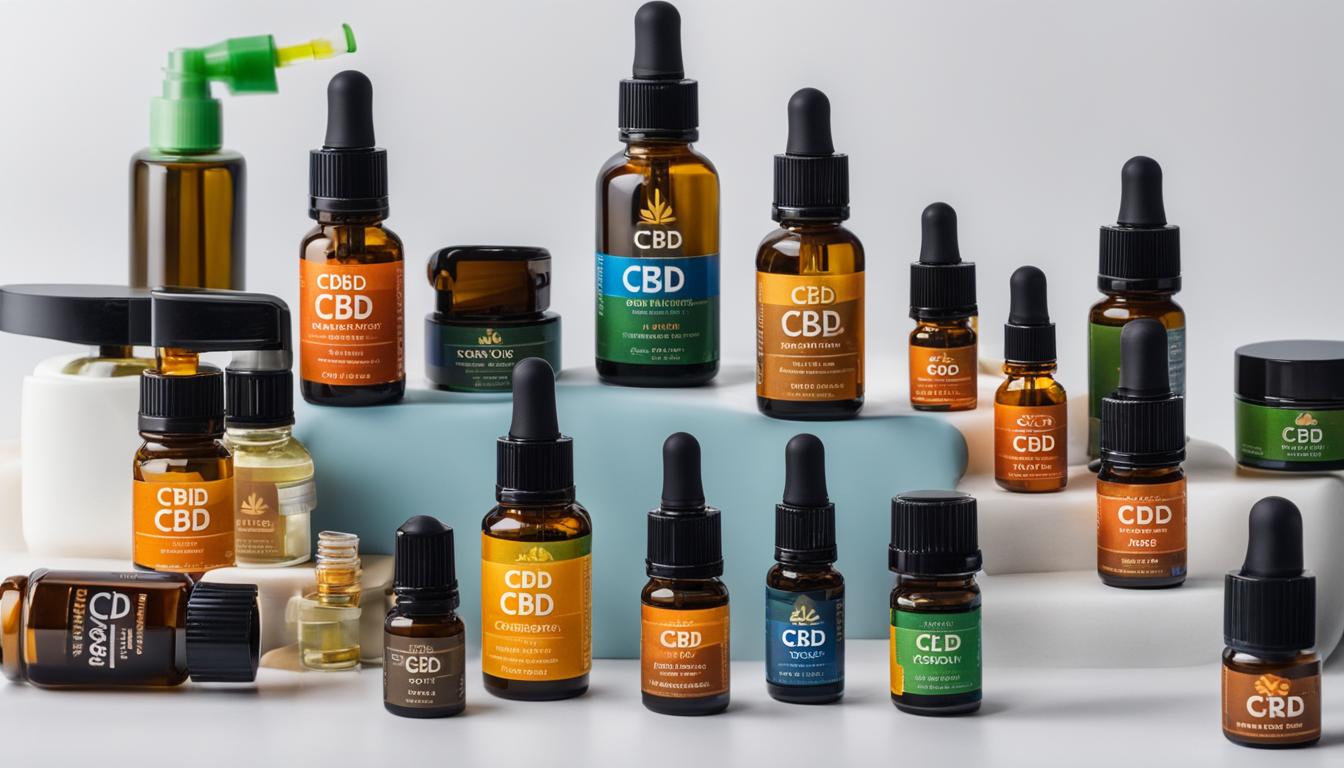CBD Oil for Anxiety: Usage Tips & Benefits
The journey to soothe anxiety often leads many to the natural benefits of the Cannabis sativa plant, where CBD—cannabidiol—has emerged as a beacon of hope. With the increasing popularity of this non-psychoactive compound, understanding how to use CBD oil for anxiety has garnered the attention of those seeking alternatives to traditional anxiety medications. Unlike THC, its intoxicating counterpart, CBD provides a calmative effect without the high, offering a promising reprieve for the anxious mind.
Among the plethora of options available, products like CBDistillery Relief + Relax Full-Spectrum CBD Oil and Joy Organics Premium CBD Softgels have established a foothold in the wellness market, each providing distinctive CBD oil benefits for anxiety. With anxiety disorders cited as significant mental health issues in the United States, the exploration of CBD as a viable method for symptomatic relief is more pertinent than ever.
Key Takeaways
- Understanding effective usage of CBD oil can enhance its anxiety-relieving properties.
- Full-spectrum CBD products may offer comprehensive benefits by including a variety of cannabis plant compounds.
- Products like Joy Organics' Softgels are catered toward daily anxiety management and ease of use.
- Legal changes, such as the 2018 Farm Bill, have made hemp-derived CBD products more accessible.
- Choosing the right CBD product requires consideration of individual symptoms and preference.
- Quality and safety should be paramount when selecting CBD oil for anxiety relief.
Understanding CBD Oil and Its Role in Treating Anxiety
Anxiety, a multifaceted mental health challenge, often leads individuals to explore various therapeutic options. Among these, CBD oil has gained significant attention for its potential in managing symptoms associated with anxiety and depression. Delving into the nature and benefits of CBD oil reveals why this natural compound might become a cornerstone in personal wellness routines, particularly for those suffering from generalized anxiety disorder, social anxiety disorder, and panic attacks.
What is CBD Oil?
CBD oil is a natural extract derived from the Cannabis sativa plant, championed for its non-intoxicating properties. Far from the psychoactive effects of THC, CBD, a prominent cannabinoid within the plant, is lauded for its ability to influence mental health positively. It's this non-psychoactive profile that allows users to experience therapeutic benefits without the concern of a ‘high,' making cbd oil for anxiety and depression an area of growing interest and research.
The Science Behind CBD and Anxiety Relief
Research into CBD's impact on anxiety is still evolving, but promising studies have begun to elucidate the science behind its effects. For example, a 2020 study involving adults in New Zealand pointed to significant improvements in daily function and reductions in anxiety and depression symptoms following CBD treatment. These findings suggest that CBD oil could play a vital role not only as a complementary therapy but potentially as a primary treatment method for conditions such as cbd oil for generalized anxiety disorder and cbd oil for panic attacks.
The interaction of CBD with the endocannabinoid system—which plays a role in regulating mood and stress responses—might be the key to its anxiolytic effects. While more comprehensive clinical trials are necessary, current data points to a future where CBD oil is a widely accepted component of anxiety management strategies.
Taking a closer look at CBD's application, consumers are presented with various options to address their particular forms of anxiety. Understanding personal symptoms and preferences is critical in selecting the most suitable product, whether aiming for overall stress reduction or targeted relief from acute panic attacks. With ongoing research and increased understanding of dosage and administration methods, CBD oil remains a hopeful avenue for many grappling with anxiety.
As we continue to map the intricate relationship between CBD and mental health, it's clear that this plant-derived remedy offers more than just a whisper of relief. For those whose lives are overshadowed by the persistent hum of anxiety, CBD oil beckons with a promise of tranquility, backed by a science that is steadily gaining confidence.
Legal Status of CBD Oil in the United States
The legality of CBD oil has been a hot topic since the decisive year of 2018 when the United States Congress passed the 2018 Farm Bill. This pivotal piece of legislation altered the legal landscape for hemp and hemp-derived products, including CBD oil, by amending the Controlled Substances Act. Here's a closer look at how this game-changing bill has influenced the current status of CBD oil from both a federal and state perspective.
According to the Bill, hemp was removed from the definition of marijuana, making hemp-derived CBD products containing less than 0.3% THC federally legal. However, CBD products harboring more than 0.3% THC still fall under the category of marijuana—rendering them federally illegal. Nevertheless, various states have enacted their own laws regarding THC-rich CBD products, some of which diverge from federal guidelines. Comprehending and adhering to these discrepancies is essential for both consumers and producers.
- Federally legal: Hemp-derived CBD with
- Federally illegal: CBD with > 0.3% THC
- State laws: Vary significantly; state-specific legislation in play
Furthermore, the FDA regulations on CBD add another layer of complexity. The FDA has not approved nonprescription CBD products, which raises concerns about the accuracy of product labeling and the verification of health claims made by CBD products. Consumers need to be vigilant, ensuring they purchase from reputable sources with rigorous product testing and transparent ingredient lists.
| FDA Stance | Labeling Accuracy | Health Claims Verification |
|---|---|---|
| Nonprescription CBD unapproved | Must ensure accurate labeling | Health claims should be evidence-based |
It is therefore crucial for individuals interested in using CBD oil—whether for therapeutic purposes or wellness—to stay informed about the most current laws and regulations. Even as the legal environment continues to evolve, the safety, efficacy, and legal compliance of CBD oil products remain of utmost importance to safeguard consumer interests.
Comparing CBD Oil with Other Anxiety Treatments
When evaluating the landscape of anxiety treatment, the comparison of CBD oil vs SSRIs truly stands out. Unlike the traditional approach utilizing SSRIs, which focus on serotonin level management, CBD oil works through modulation of receptor-based signaling, offering an alternative anxiety relief. This natural remedy has piqued the interest of many looking for more holistic avenues of care, free from the high associated with THC.
While SSRIs have a long-standing position in mainstream treatment protocols, CBD's emergence as a potential anxiety therapy has led to its consideration as both a stand-alone and complementary intervention. The following sections will discuss how CBD measures up to traditional medications and explores its versatility as a complementary therapy.
Traditional Anxiety Medications vs. CBD Oil
SSRIs, commonly prescribed for anxiety, operate by blocking the reuptake of serotonin in the brain to boost mood and reduce anxiety. However, CBD oil offers a different mechanism of action. By potentially influencing how CB1 and CB2 receptors send serotonin signals, CBD oil is thought to offer anxiety treatment benefits without the typical side effects of medication. This interaction could explain why individuals might experience the calming, anti-anxiety effects of CBD oil without the psychoactivity often associated with cannabis products.
Complementary Therapies Using CBD Oil
Beyond the traditional medication spectrum, CBD oil for anxiety stands as an adjunct to other therapeutic avenues such as cognitive behavioral therapy (CBT) and lifestyle modifications. Its role as an adjunct therapy may provide a synergistic effect, amplifying the benefits of other treatments. How CBD oil interfaces with these therapies is continually under exploration, supporting the narrative of alternative anxiety relief through a more integrated, holistic approach to mental health management.
| Treatment Type | Mechanism of Action | Treatment Duration | Side Effects | Non-Psychoactivity |
|---|---|---|---|---|
| SSRIs | Inhibit serotonin reuptake | Long-term | Yes, varies per individual | Not applicable |
| CBD Oil | Modulates receptor signaling | Can be short or long-term | Generally fewer and milder | Yes |
As evidenced by the table, the key advantage of CBD oil in anxiety treatment lies in its mechanism of action and its mild side effect profile, coupled with its non-psychoactive properties. These factors contribute to the growing consideration of CBD oil as a preferable option for those seeking alternative anxiety relief.
How to Use CBD Oil for Anxiety
Understanding how to use CBD oil for anxiety is essential for individuals looking to alleviate anxiety symptoms effectively. From choosing the right form of CBD to determining the ideal cbd oil dosage for anxiety, the process can be personalized to meet individual needs and preferences.
The versatility of CBD allows for various methods of administration, including oral consumption with oils and edibles or inhalation via vaping. The mode in which CBD is administered can impact both the onset and duration of its effects, thereby influencing the overall experience.
A crucial aspect of using CBD oil for anxiety management is identifying the appropriate dosage. While standardized dosing guidelines are still under development, research indicates that doses ranging between 300 and 600 mg may significantly mitigate anxiety symptoms. However, starting with a lower dosage and adjusting based on individual response and health factors is recommended.
| Method of Administration | Typical Onset Time | Duration of Effect | Recommended for |
|---|---|---|---|
| Oral Consumption (Oils, Capsules) | 30 minutes to 2 hours | Varies based on product | Daily management of anxiety |
| Edibles (Gummies, Chocolates) | 1 to 2 hours | Longer lasting | Those preferring pre-determined dosages |
| Inhalation (Vaping) | Immediate to a few minutes | Shorter duration | Acute anxiety relief |
- Consult with a healthcare provider to establish a starting point for cbd oil dosage for anxiety.
- Begin with a low dosage and gradually increase, while closely monitoring the body's response.
- Take into account personal health factors and potential interactions with medications.
- Choose a method of administration that aligns with lifestyle preferences and the nature of the anxiety being treated.
By incorporating these considerations, individuals can utilize CBD oil as a potent tool to manage and potentially alleviate anxiety symptoms, fostering an improved quality of life.
Choosing the Right CBD Oil for Your Needs
With the surge in popularity of CBD for wellness, it's crucial to select the right type of CBD oil that aligns with your personal health goals and legal considerations. Whether seeking relief from anxiety or exploring the potential health benefits of CBD, understanding the distinctions between full-spectrum CBD, broad-spectrum CBD, and CBD isolate is a key step in making an informed decision.
Full-Spectrum, Broad-Spectrum, and CBD Isolate Explained
When you come across full-spectrum CBD, it denotes a product that contains all phytochemicals naturally found in the cannabis plant, including CBD, terpenes, essential oils, and other cannabinoids, such as THC. However, in full-spectrum CBD oil, the THC content is limited to 0.3% or less to comply with federal regulations.
Broad-spectrum CBD is similar to full-spectrum CBD but contains an assortment of the cannabis plant's compounds, with most THC removed. This makes it a middle ground between full-spectrum CBD and CBD isolate, and can be an ideal choice for those looking to avoid THC entirely while still reaping the benefits of other cannabinoids and terpenes.
CBD isolate is the purest form available, consisting of over 99% cannabidiol. It is completely free of THC and other plant compounds. This option is best suited for individuals who require a high dose of CBD or those with sensitivities to THC and other cannabinoids.
Understanding these categories helps individuals navigate toward quality CBD products that align with their wellness goals and legal stipulations in their area.
Identifying Quality CBD Oil Brands
The market is saturated with various brands claiming to offer high-quality CBD oil. To genuinely identify quality CBD oil brands, look for a Certificate of Analysis (COA). A COA is a document issued by an accredited laboratory that confirms a product's chemical composition. Reputable CBD brands will always provide a COA to validate the potency of their products as well as confirm that they are free from harmful levels of contaminants.
If a product is labeled as full-spectrum, broad-spectrum, or CBD isolate, the COA should verify the accuracy of these claims, providing transparency about the cannabinoid profile, terpene content, and the absence or presence of THC. Without third-party testing, certified by a COA, you cannot be sure of the product's claim, so always verify before purchase.
Whether you're a seasoned user or new to the world of CBD, choosing a reliable brand and the right type of product is crucial to ensure safety, legality, and the desired wellness outcomes. To assist with this, an array of quality CBD products have been meticulously vetted and reviewed by industry experts, shaping a market driven by consumer trust and scientific substantiation.
Best CBD Oil Products for Different Types of Anxiety
As research sheds more light on the therapeutic benefits of CBD oil, individuals around the country are turning to this natural remedy for varied forms of anxiety. With countless products on the market, it's vital to choose one that aligns with one's specific needs, whether it be for general anxiety, social situations, or to manage PTSD symptoms.
Generalized Anxiety Disorder (GAD) and CBD Oil
Those grappling with GAD may find relief in products designed for full-bodied stress management. The CBDistillery Relief + Relax Full-Spectrum CBD Oil offers a concentrated dose that may help alleviate the chronic anxiety and stress that characterizes GAD, providing a sense of calm through daily upheavals.
Social Anxiety and CBD Oil
Social situations can trigger overwhelming anxiety for many, but cbd oil for social anxiety might offer a discrete and manageable solution. Soul CBD Gummies are recommended due to their easy-to-use format and the ability to take a controlled dosage without drawing attention in public settings.
PTSD and CBD Oil Options
For those confronting PTSD, a combined approach using CBD oil and other established therapies can yield beneficial results. Products such as Joy Organics Premium CBD Softgels might provide ease of use with consistent dosing to assist in the daily management of PTSD symptoms.

| Type of Anxiety | Recommended CBD Product | Potential Benefits |
|---|---|---|
| Generalized Anxiety Disorder (GAD) | CBDistillery Relief + Relax Full-Spectrum CBD Oil, 500 mg | May promote relaxation and ease chronic stress |
| Social Anxiety | Soul CBD Gummies | Convenient, discrete, and easy to manage dosage |
| PTSD | Joy Organics Premium CBD Softgels | Consistent dosing, convenient for daily use |
While personal experiences with CBD oil for anxiety and stress will vary, these recommended products capture the potential for a calmer mind and reduced anxiety symptoms. However, users should always consider their health circumstances and consult with healthcare professionals before starting any new supplement regimen.
Effective Dosage Guidelines for CBD Oil
Finding an effective cbd oil dosage for anxiety is a quest for balance that is highly subjective to the individual. Varying from person to person, dosage requirements can also depend on the nature and intensity of the anxiety experienced. Optimal dosage can influence the effectiveness of CBD oil, making strict adherence to cbd oil usage guidelines pivotal.
For people confronted with situations such as public speaking—an event known to spark anxiety—a dosage close to 300 mg may offer considerable relief. However, this is not a universal benchmark, as each individual's response to CBD can differ due to factors like body weight, metabolism, and the severity of the anxiety condition.
Building a Proper Dosage Plan
Establishing a proper dosage plan for CBD oil involves a personalized approach initiated with a modest amount. Gradual increments allow for careful monitoring of effects, ensuring users can identify the precise amount needed for relief without exceeding a beneficial threshold. Crucially, all changes to dosage should be discussed with and monitored by a healthcare professional, especially for individuals taking other medications, to prevent adverse interactions.
| Starting Dosage | Method of Increase | Checkpoints for Assessment | Notes |
|---|---|---|---|
| Low Dosage (e.g., 25-50 mg) | Incremental (e.g., increase by 25 mg weekly) | Every 2-3 days | Monitor for any changes in symptoms or side effects |
| Moderate Dosage (e.g., 100-300 mg) | Gradual adjustments as needed | After each adjustment | Seek medical advice before significant dosage changes |
| Targeted Dosage (Varies) | Specific to individual's response | Long-term monitoring | Consistency is key; maintain the same dosage if effective |
In conclusion, when approaching cbd oil dosage for anxiety, the tailored plan should aim for the least amount of CBD that produces the desired effect. By adhering to recommended cbd oil usage guidelines and incorporating professional advice, users can safely navigate towards finding their optimal CBD oil dosage for anxiety relief.
Administration Methods of CBD Oil for Anxiousness
When considering cbd oil administration for anxiety, the selection of method is a critical decision that affects the rate and efficiency of CBD's calming effects. Oral cbd consumption and inhalation through vaping cbd oil are popular means of taking CBD, each offering distinct benefits and conveniences tailored to individual needs and circumstances.
Sublingual oils and edibles fall under the umbrella of oral CBD products and are renowned for their ease of use and longer-lasting effects. However, users seeking immediate relief, particularly from acute anxiety flare-ups, may find vaping cbd oil to be a faster-acting alternative.
| Administration Method | Onset of Effects | Duration of Effects | Suitable For |
|---|---|---|---|
| Oral Consumption | 30 minutes to 2 hours | Long-term relief | Consistent, all-day anxiety management |
| Vaping | Immediate to a few minutes | Short-term relief | Immediate, acute anxiety situations |
To optimize the benefits of CBD for anxiety relief, users should consider factors such as the speed of onset, the duration of efficacy, and individual preferences for administration methods. Both vaping cbd oil and oral cbd consumption offer therapeutic opportunities for managing anxiety, catering to the unique needs of each individual.
Success Stories: CBD Oil for Anxiety Reviews
Amid glowing testimonials and emerging user narratives, the panorama of cbd oil for anxiety reviews echoes with the voices of those whose daily lives have been touched by the calming nature of CBD oil. From social media to wellness forums, cbd oil user experiences pave the way for others seeking solace from the grip of anxiety.
While research into CBD's efficacy for anxiety continues, personal accounts provide a unique window into the real-world impacts of CBD oil. The following are representative testimonials from individuals who have incorporated CBD oil into their anxiety management regimen:
“Since I started using CBD oil, my anxiety attacks have become less frequent and more manageable. It's not a cure-all, but it's an essential part of my wellness toolkit.” – Anonymous CBD User from Healthline's Community
“Navigating life with social anxiety felt overwhelming until I found CBD gummies. They are discreet, easy to dose, and they help me feel more at ease in social settings.” – Contributor to Soul CBD's Online Reviews
These narratives underscore the diversity of user experiences, illustrating that while CBD oil may not universally alleviate anxiety, it has markedly improved the quality of life for some. To encapsulate the varied experiences with CBD oil, here's a comparative analysis:
| User Feedback Themes | Positive Impact Reported | Negative or Neutral Impact Reported |
|---|---|---|
| Frequency of Anxiety Episodes | Decreased occurrence of anxiety attacks | No noticeable change in episode frequency |
| Ease of Social Interactions | Increased comfort in social settings | Limited or no effect in social scenarios |
| Daily Functionality | Improved ability to perform daily tasks | Insignificant impact on day-to-day activities |
The anecdotal efficacy of CBD oil for anxiety, given its ability to work as an anxiolytic, reinforces the importance of individualized treatment. Personal reports, although not a substitution for scientific evidence, are an invaluable asset to both newcomers and seasoned CBD oil users alike, especially when navigating the nuances of dosage, administration, and product selection.
It's critical for potential users to consider that responses to CBD are unique to each individual. A product that yields significant benefits for one person might have a disparate effect on another, a sentiment echoed across cbd oil for anxiety reviews. Accordingly, approaching CBD oil with an open but cautious mindset, ideally under the guidance of healthcare professionals, is advisable.
Ultimately, the compendium of cbd oil user experiences stands as a testament to the potential of CBD oil as a complementary approach to anxiety management. While clinical research progresses, these real-world examples offer hope and practical insights for those considering this naturally-sourced option for alleviating anxiety.
The Safety Profile of CBD Oil for Anxiety
Amidst the burgeoning popularity of cannabidiol (CBD) as a therapeutic agent, discussions around the safety of cbd oil continue to attract attention within medical and consumer circles. Noted for being a well-tolerated cbd treatment, research indicates an impressive safety profile for CBD oil when used for anxiety relief.
Crucial to its commendable safety stature is the finding from various studies that even at high doses – up to 1500 mg per day – CBD oil remains well-tolerated by most people. Such data is instrumental in propelling CBD oil as a viable option for those seeking alternatives to traditional anxiety medications, suggesting a broader therapeutic window than many conventional treatments.
Despite its positive safety profile, it is essential to strike a note of caution. The absence of comprehensive long-term safety data implies that while immediate adverse effects may be rare, the full extent of possible long-term consequences requires further exploration. Therefore, individuals considering CBD oil, particularly those with pre-existing health conditions, should do so in consultation with healthcare professionals.
This prudent approach to the safety of cbd oil is not solely a mandate for consumers but also a shared responsibility with healthcare providers, researchers, and regulators. Collective efforts will ensure that the potential and limitations of this promising treatment are fully understood and communicated.
| Dosage Studied | Common Tolerability | Long-term Safety Data | Recommended Action |
|---|---|---|---|
| Up to 1500 mg/day | Well-tolerated in most cases | Limited | Consult with healthcare professionals |
In light of the compelling safety considerations of CBD oil, consumers can approach this anxiolytic resource with cautious optimism. While side effects might be modest for most users, recognizing the importance of personalized healthcare guidance remains paramount. As research develops, existing data on the safety of cbd oil provides a reassuring basis for its continued exploration as an anxiety treatment.
Potential Side Effects and How to Mitigate Them
While the therapeutic potential of CBD oil is increasingly recognized, particularly for anxiety management, it is also crucial to be informed about possible cbd oil side effects. A minority of individuals may experience adverse reactions from CBD usage, which can include sedation, vivid dreams, fatigue, diarrhea, changes in appetite, and weight fluctuations. For those considering CBD oil as a treatment, understanding and managing cbd oil adverse reactions is an essential part of a responsible wellness plan.
Many of the side effects associated with CBD oil are generally mild and can vary in intensity based on an individual's physiology and the dosage used. To minimize the possibility of side effects, here are some strategies worth considering:
- Start with a low dosage of CBD and gradually increase it while monitoring your body's response.
- Consult with a healthcare professional, especially if you are taking other medications or supplements that may interact with CBD.
- Pay attention to the grapefruit warning on medication labels as it can predict potential interactions with CBD's effect on drug metabolism.
- Stay well-hydrated and maintain a balanced diet to help manage digestive side effects like diarrhea.
- Adhere to manufacturer and product-specific guidelines on usage and storage.
Monitoring for side effects and adjusting CBD intake accordingly are important steps in managing individual reactions. Should you encounter adverse effects, reducing the dosage or discontinuing use may be necessary. Regular consultation with a healthcare provider can help navigate these situations effectively.
| Side Effect | Management Strategy | Consult Healthcare Provider |
|---|---|---|
| Sedation & Vivid Dreams | Consider lower dosage or take CBD earlier in the day | Yes, if persistent or disruptive |
| Fatigue | Adjust timing of dosage; monitor energy levels | Yes, especially if symptoms affect daily activities |
| Diarrhea | Stay hydrated; can also lower dosage | Yes, if severe or prolonged |
| Appetite & Weight Changes | Maintain a balanced diet; monitor weight regularly | Yes, if significant changes are observed |
Although understanding and managing cbd oil adverse reactions is important, the majority of individuals do not experience severe side effects, allowing them to enjoy the potential benefits of CBD oil for anxiety relief. Whenever in doubt, seeking the advice of medical professionals is essential to ensure safe and effective use of CBD oil.
Interactions Between CBD Oil and Medications
Exploring the wellness benefits of CBD oil often brings to light questions about cbd oil drug interactions and medication effects with CBD. Understanding how CBD interacts with various medications, including blood thinners and SSRIs (Selective Serotonin Reuptake Inhibitors), is crucial for those considering it as part of their health regimen. Healthcare professionals should ideally evaluate the impact of CBD on any existing medication plans to ensure safety and efficacy.
One key signal for potential interactions is the “grapefruit warning” commonly found on certain medication labels. This warning indicates that the drug's metabolism could be affected by the consumption of grapefruit or similar substances—in this case, CBD. As a result, individuals should be vigilant and consult their healthcare provider before integrating CBD oil into their therapy, especially if their medications carry this warning.

The table below highlights common types of medications that are known to interact with CBD, along with potential effects that may emerge from such interactions. As research continues to evolve, these interactions reflect the complexity of the body's response to combined substance use, further underscoring the need for professional medical guidance.
| Medication Category | Common Medication Example | Potential Interaction with CBD | Impact on Medication Efficacy | Recommended Action |
|---|---|---|---|---|
| Anticoagulants (Blood Thinners) | Warfarin | Inhibition of metabolic enzymes | Potential increased risk of bleeding | Regular monitoring of INR levels |
| Antidepressants (SSRIs) | Sertraline (Zoloft) | Altered concentration in blood | May enhance or diminish antidepressant effects | Assess mood and side effects frequently |
| Antiepileptics | Carbamazepine (Tegretol) | CBD may influence drug levels | Potential reduced seizure control | Monitor seizure activity and drug levels |
| Benzodiazepines | Alprazolam (Xanax) | Possible increased sedation | Risk of excessive drowsiness | Adjust dosage with medical oversight |
Additionally, as CBD is further studied within the context of clinical settings and trials, awareness about interactions will likely expand. Those interested in using CBD, particularly in high doses or as part of a treatment for serious conditions, should do so under strict medical consultation. This approach will help navigate the complexities surrounding medication effects with CBD and ensure personal health and safety are maintained.
Accessing CBD Oil: From Prescription to Purchase
As the landscape of health and wellness embraces the benefits of CBD oil, understanding the legal pathways for purchasing cbd oil legally has become crucial. Different states within the U.S. have a myriad of regulations that determine how consumers can obtain CBD oil, whether for medical or general wellness use. Below, we navigate the waters of state laws and identify how to find trustworthy sources that provide quality CBD oil.
Navigating State Laws and Regulations
Legislation regarding the possession and use of CBD oil can be as varied as the states themselves. While federal law has legalized hemp-derived CBD products containing less than 0.3% THC under the 2018 Farm Bill, state laws continue to fluctuate, with some states implementing stricter measures. In regions where medical cannabis is legalized, obtaining a prescription may be a necessary step prior to making a purchase. Consumers should diligently research the laws in their particular state to ensure compliance when seeking to acquire CBD oil.
Finding Reputable Online and Local Dispensaries
Whether you are new to the world of CBD oil or an experienced user looking for high-quality products, locating reputable cbd oil dispensaries is imperative. With the proliferation of online platforms and brick-and-mortar shops, consumers should prioritize dispensaries that provide extensive product information, including third-party laboratory testing results and Certificates of Analysis (COA). These credentials confirm that the products meet safety standards and label accuracy, offering peace of mind concerning the integrity of the purchased CBD oil.
A trustworthy dispensary will address safety and efficacy concerns transparently, and typically have knowledgeable staff available to guide you through product selection based on your specific needs. When purchasing cbd oil legally, always ensure that the dispensary adheres to state regulations and industry best practices, cementing the basis for a secure and beneficial CBD oil experience.
Conclusion
In summary, cbd oil therapy continues to gain traction as a complementary approach in managing anxiety with cbd. The personal accounts of those who have found solace in its usage, alongside early scientific findings, indicate CBD oil's potential efficacy in easing anxiety symptoms. While definitive clinical guidelines are yet to be established, the versatility in administration and dosage caters to the personalization of treatment strategies. Crucially, it reinforces the need to prioritize a holistic view of health, taking into account individual needs and conditions.
It's essential for individuals to consider professional guidance when navigating the landscape of CBD. From consultation on cbd oil dosage for anxiety to understanding the legal nuances when acquiring CBD products, the role of healthcare professionals cannot be overstated. In this evolving field, their expertise provides a safeguard, ensuring that those seeking anxiety relief through CBD do so with a foundation of knowledge and safety measures.
Ultimately, the journey with CBD oil as a tool for anxiety management is a personal and often unique experience. As researchers continue to unlock its mysteries, and legislation adapts to the growing acceptance of CBD as a therapeutic substance, the future of cbd oil therapy looks promising. Herein lies a balancing act between harnessing the benefits, managing expectations, and heeding safety concerns—a multifaceted approach that may offer reprieve for those navigating the complexities of anxiety.
FAQ
What is CBD Oil?
CBD oil is a natural product derived from the Cannabis sativa plant, specifically from the cannabinoid called cannabidiol (CBD). Unlike THC, another compound found in cannabis, CBD does not have psychoactive properties and won't produce a ‘high.' CBD oil is used for its potential health benefits, including managing anxiety and depression.
How does CBD Oil help in treating anxiety?
CBD oil is thought to interact with the body's endocannabinoid system, which helps regulate various functions, including mood and anxiety. Some studies suggest that CBD may alter serotonin signals, which play a role in mental health. It may work as either a monotherapy or an adjunct therapy to help reduce symptoms of anxiety disorders such as GAD, social anxiety, and panic attacks.
What is the legal status of CBD Oil in the United States?
After the 2018 Farm Bill, hemp-derived CBD products containing less than 0.3% THC are federally legal in the United States. However, CBD products with more than 0.3% THC are still federally illegal, though they may be legal under some state laws. Consumers should check their state's regulations and be aware that nonprescription CBD products aren't FDA-approved.
How does CBD Oil compare to traditional anxiety medications?
Unlike traditional anxiety medications such as SSRIs, which work by increasing serotonin levels, CBD oil may modify serotonin signals without the intoxicating effects of THC. CBD oil offers an alternative for those seeking a different approach to anxiety relief and may be used in conjunction with other therapies for anxiety disorders.
How should CBD Oil be used for anxiety?
CBD oil for anxiety can be used in several ways, including orally through oils and edibles, or through inhalation via vaping. The method of administration, dosage, and individual health considerations should be taken into account, often starting with a low dose and gradually increasing as needed under the guidance of a healthcare professional.
What are the differences between Full-Spectrum, Broad-Spectrum, and CBD Isolate?
Full-spectrum CBD oil contains all natural compounds found in the hemp plant, including up to 0.3% THC. Broad-spectrum CBD oil contains most cannabinoids but typically has non-detectable levels of THC. CBD isolate is the purest form, consisting solely of CBD without any other cannabinoids or THC.
How do I identify high-quality CBD Oil brands?
High-quality CBD oil brands will provide transparency about their products' sourcing, manufacturing, and lab testing. Consumers should look for a Certificate of Analysis (COA) from third-party testing to verify the product's potency and purity. Reputable brands will also adhere to regulations and good manufacturing practices.
What types of CBD Oil products are recommended for different types of anxiety?
The best CBD oil product for anxiety may depend on the type of anxiety being treated. Full-spectrum CBD oils like CBDistillery Relief + Relax are often recommended for generalized anxiety disorder (GAD), while edibles might be more suited for social anxiety due to their discreet nature. For PTSD, CBD oil combined with other therapies might provide relief.
How do I build an effective dosage plan for CBD Oil to treat anxiety?
Building an effective dosage plan for CBD oil should involve starting with a low dose and gradually increasing it while monitoring its effects on your anxiety. Consultation with a healthcare professional is recommended, especially when considering your personal health factors or if you are taking other medications.
Are there specific administration methods for CBD Oil to treat anxiousness?
Yes, CBD oil can be administered in different ways such as orally (tinctures, oils, edibles) and through inhalation (vaping). The choice of administration method may depend on personal preference, onset time of relief required, and ease of use. Oral consumption generally has a longer onset time but longer-lasting effects compared to vaping.
What do user reviews say about CBD Oil for anxiety?
Many user reviews and personal testimonials suggest that CBD oil has helped with anxiety symptoms. However, responses to CBD can be subjective, and what works for one person may not work for another. These experiences, while valuable, should be considered alongside scientific evidence.
Is CBD Oil safe to use for anxiety, and what is its safety profile?
CBD oil is generally considered safe and well-tolerated, with studies showing that individuals can tolerate high doses up to 1500 mg/day. However, as the long-term safety data is limited, it is important to use CBD cautiously, especially for those with pre-existing health conditions.
What side effects might be experienced when using CBD Oil, and how can they be mitigated?
Some potential side effects of using CBD oil include sedation, vivid dreams, fatigue, diarrhea, changes in appetite, and weight changes. To mitigate these side effects, it is advisable to start with a low dose of CBD and gradually increase it as needed, and consult with a healthcare professional before use.
Can CBD Oil interact with other medications?
Yes, CBD oil can interact with various medications, including blood thinners and SSRIs, affecting the metabolism and potentially altering their effectiveness and safety. It is crucial to consult with a healthcare professional to understand the potential interactions with any existing medications.
How can I legally obtain CBD Oil?
Legal access to CBD oil depends on state laws. In some states, a prescription may be necessary, especially if the product contains higher levels of THC. Purchasing from reputable online or local dispensaries that provide third-party testing and COAs ensures you're getting a quality product within the confines of the law.










Leave a Reply